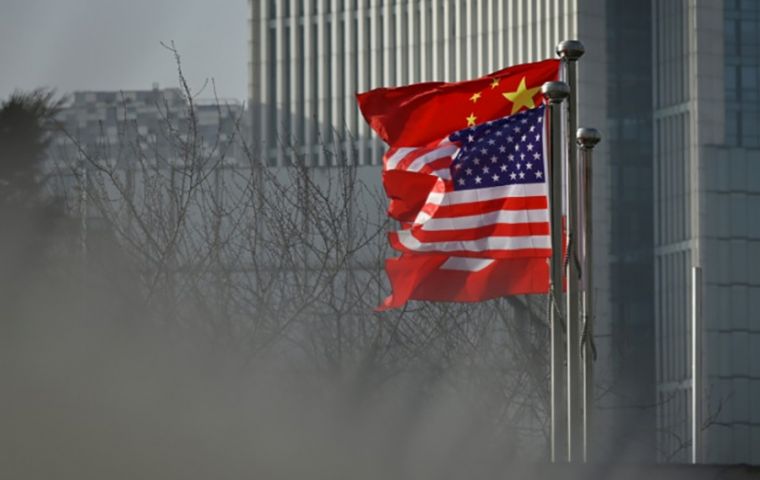MercoPress. South Atlantic News Agency
Beijing/US media war: three WSJ newsroom journalists expelled over an OPED column
 Chinese spokesman Geng Shuang said the WSJournal op-ed - titled “China is the Real Sick Man of Asia” had a “racially discriminatory” and “sensational” headline
Chinese spokesman Geng Shuang said the WSJournal op-ed - titled “China is the Real Sick Man of Asia” had a “racially discriminatory” and “sensational” headline China on Wednesday ordered three reporters from The Wall Street Journal to leave the country over what Beijing deemed a racist headline, in one of the harshest moves against foreign media in years.
The United States protested what it called an affront to press freedom, one day after it tightened rules on Chinese media organizations that it considers state propaganda.
Chinese foreign ministry spokesman Geng Shuang said the Journal op-ed - titled “China is the Real Sick Man of Asia” - had a “racially discriminatory” and “sensational” headline, and slammed the newspaper for not issuing an official apology.
“As such, China has decided that from today, the press cards of three Wall Street Journal reporters in Beijing will be revoked,” Geng told a press briefing.
The Journal reported that deputy bureau chief Josh Chin and reporter Chao Deng, both US nationals, as well as reporter Philip Wen, an Australian, had been ordered to leave the country in five days.
US Secretary of State Mike Pompeo condemned the expulsions and voiced hope that China would one day allow its citizens “the same access to accurate information” that Americans enjoy.
“Mature, responsible countries understand that a free press reports facts and expresses opinions,” Pompeo said in a statement. “The correct response is to present counter arguments, not restrict speech,” he said.
The three journalists are in the Wall Street Journal's news section, which is not linked to the editorial and opinion section.
The newspaper's publisher, William Lewis, said the outlet was “deeply disappointed” with China's decision and asked that the visas of the three reporters be reinstated.
“This opinion piece was published independently from the WSJ newsroom and none of the journalists being expelled had any involvement with it,” Lewis said in a statement.
“The need for quality, trusted news reporting from China is greater than ever; today's decision to target our News department journalists greatly hinders that effort,” he said. “However, this has clearly caused upset and concern amongst the Chinese people, which we regret.”
The op-ed, written by Bard College professor Walter Russell Mead, criticized the Chinese government's initial response to the new coronavirus outbreak - calling the Wuhan city government at the virus epicenter “secretive and self-serving”, while dismissing national efforts as ineffective.
The phrase “sick man of Asia” originally referred to China in the late 19th and early 20th century, when it was exploited by foreign powers during a period sometimes called the country's “century of humiliation”.
“At American newspapers, writers typically do NOT write or approve the headlines,” Mead tweeted after the op-ed was published. Argue with the writer about the article content, with the editors about the headlines.“
The new coronavirus epidemic has killed more than 2,000 people in China and infected more than 74,000, and has spread to at least two dozen countries.
Geng said the Feb 3 piece ”slandered the efforts of the Chinese government and the Chinese people to fight the epidemic“.
The expulsions come a day after the United States angered China for classifying five state media outlets, including Xinhua agency and the China Global Television Network, as foreign missions, with State Department officials saying they were part of Beijing's growing ”propaganda“ apparatus.
China's nationalistic Global Times newspaper on Wednesday implied a link between the WSJ expulsions and the new US policy.
”There are no connections between the two events, but it is not completely coincidental that they happened at about the same time,“ it said an editorial on its English-language website.
”Together they show the ideological conflict between China and the US is intensifying. The two countries' values are drifting apart ... This is not a good sign.”




Top Comments
Disclaimer & comment rulesCommenting for this story is now closed.
If you have a Facebook account, become a fan and comment on our Facebook Page!